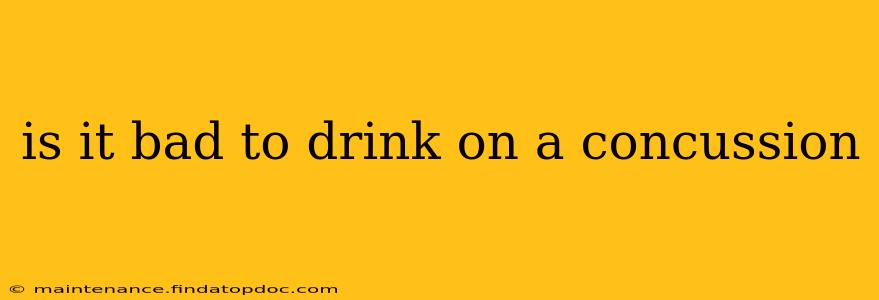Experiencing a concussion is serious, and understanding how to manage your recovery is crucial. One question that frequently arises is whether alcohol consumption is safe following a head injury. The short answer is a resounding no. Drinking alcohol after a concussion can significantly hinder your recovery and potentially worsen your symptoms. Let's delve into the reasons why.
Why Alcohol and Concussions Don't Mix
Alcohol is a depressant, meaning it slows down brain activity. After a concussion, your brain is already vulnerable and working hard to heal. Adding alcohol into the mix puts extra strain on your already compromised neurological system. This can lead to a range of negative consequences.
Alcohol's Impact on Brain Recovery
- Delayed Healing: Alcohol interferes with the brain's natural healing process. It can prolong the duration of symptoms and increase the risk of long-term complications.
- Increased Inflammation: A concussion causes inflammation in the brain. Alcohol can exacerbate this inflammation, leading to more severe symptoms and a longer recovery period.
- Exacerbated Symptoms: Alcohol can worsen existing concussion symptoms such as headaches, dizziness, nausea, and cognitive difficulties. It can also trigger new symptoms.
- Sleep Disturbances: While sleep is crucial for brain repair, alcohol can disrupt sleep patterns, leading to further complications in recovery. Even though it might initially make you drowsy, alcohol fragments sleep, reducing its restorative benefits.
What Happens if You Drink Alcohol After a Concussion?
The effects of alcohol consumption after a concussion can vary depending on several factors, including the severity of the concussion, the amount of alcohol consumed, and individual differences. However, some common consequences include:
- Prolonged Headaches: Intensified and more frequent headaches are a common complaint.
- Cognitive Impairment: Difficulties with memory, concentration, and decision-making can be significantly worsened.
- Increased Risk of Second Impact Syndrome: In rare but serious cases, drinking alcohol after a concussion could increase the risk of second impact syndrome, a life-threatening condition.
- Delayed Recovery: The overall recovery time can be significantly extended, potentially leading to chronic post-concussion syndrome.
How Long Should You Avoid Alcohol After a Concussion?
There's no magic number, but it's generally recommended to completely abstain from alcohol until you've been fully cleared by a medical professional. This typically involves a thorough neurological examination and potentially neuropsychological testing. Your doctor will assess your progress and advise you when it's safe to resume alcohol consumption, if at all. Rushing back to alcohol use can undermine the recovery process, potentially leading to long-term issues.
Does the Severity of the Concussion Matter?
Yes, the severity of the concussion directly impacts the length of time you should avoid alcohol. Mild concussions still require careful monitoring and abstinence from alcohol, while more severe injuries necessitate a longer period of avoidance. Always follow your doctor's specific recommendations.
What Are the Long-Term Effects of Drinking on a Concussion?
Long-term effects can include chronic headaches, persistent cognitive dysfunction, and increased susceptibility to future head injuries.
Can I Drink a Little Bit of Alcohol?
No. Even small amounts of alcohol can have a negative impact on brain recovery after a concussion. It's best to completely avoid it until you are cleared by your doctor.
What Should I Do if I've Already Drunk Alcohol After a Concussion?
If you've already consumed alcohol after a concussion, monitor yourself closely for any worsening symptoms. Contact your doctor or seek immediate medical attention if you experience any concerning changes.
In conclusion, abstaining from alcohol after a concussion is paramount for optimal recovery and minimizing the risk of long-term complications. Prioritize your health and always follow your doctor's advice. Your brain's health is essential, and responsible decision-making regarding alcohol consumption is critical during the recovery phase.
